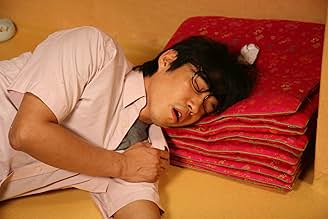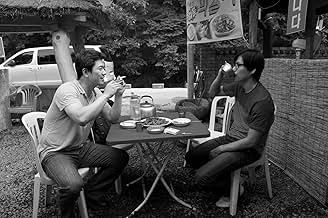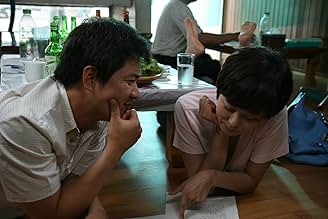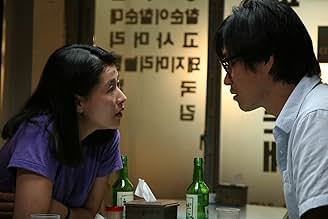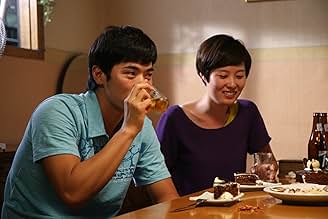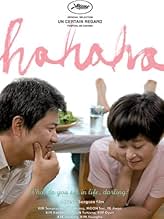Hahaha
- 2010
- 1h 55m
IMDb RATING
6.7/10
1.6K
YOUR RATING
Two friends, while having drinks together, share their memories of visiting the seaside resort of Tongyeong.Two friends, while having drinks together, share their memories of visiting the seaside resort of Tongyeong.Two friends, while having drinks together, share their memories of visiting the seaside resort of Tongyeong.
- Awards
- 6 wins & 2 nominations total
- Director
- Writer
- All cast & crew
- Production, box office & more at IMDbPro
Storyline
Featured review
Rashômon was about the multiple framings of the story.
Chungking Express is about how two different stories, or glimpses of stories can share the same emotional and physical space.
Both were incredibly important films that changed cinema and, necessarily, how we dream and follow a story.
This film is somewhere in between those two, and it extends its hybrid condition as a story framer to the territory of Woody Allen's dialogs. Allen, himself a master of narrative frames, has his how different set of quirks and obsessions, superficially expressed in his incredible dialogs. That is borrowed by this screenwriter, also the director.
The outer frame is us watching a number of photographs documenting two friends meeting in a mountain, something we never actually see, and so emphasizes the artificial nature of the device: we're seeing someone telling the story of 2 people meeting. In that meeting, those two take turns to tell the other bits of stories that happened to them in previous months. So, we are watching the meeting of 2 friends, who remember several events. 3 frames. Within each story that we are told there are some other minor frames. One character is a filmmaker, the other one a poet. In one of the episodes, there is a performance framed, and for a few moments we are not allowed to see it's a performance. This is a very tight structure, very competent writing. But the real fun of this is the interior of this framed world.
All the episodes take place in the same small village. Places are very important. So there are places we get to see repeated over and over again, with different bits of story taking place: the restaurant attended by the 3 men and 2 of the women. The hotel, where every assumed sex happens. The new unfurnished apartment. The coffee with a view over the harbor, and the harbor itself. Everyone of these spaces receives a part of the story, different moments, different characters, different pieces of the puzzle. There is a sense of interlaced lives, which we see by glimpses, by small bits, told from 2 points of view, of 2 people who are protagonists of their own stories. We understand that they pass at each other, those stories are one and the same but in the end they hardly touch each other.
Food is an important element. Food is central to every cultural idiosyncrasy in the world, Korea is not the exception and it is really sensitive how korean specificities in the relation with food are brought to the center of this mosaic. Count the scenes that develop around meals.
The last important element is the orange hat, given by the film director to his mother, who than gives it to another male character whom she's fond of, and who has a relationship with one of the women who later ends up involved with the film director. That woman ultimately understands the indirect relation between the two men while the director tries to take her to his mom's restaurant, where she had already been with the other man. That's this kind of circular relations, crossed lives that we encounter throughout this film. The hat has the same importance here as the teddy bear had in Chungking Express.
What put me out of this film was oddly something that usually never fails in korean movies: the pure qualities of the images and various aspects of the mise-en-scène. This has the cheap look of a video low-budget production, there are several aspects of light and shape that would certainly have benefited the sensitive relation the writer establishes with the spaces. Chris Doyle understands this, we don't have that here. And the framing of every scene does not remotely match the clever multiple framings in the story. That's really bad, this film might have a power that we only sense, as it is.
My opinion: 4/5
http://www.7eyes.wordpress.com
Chungking Express is about how two different stories, or glimpses of stories can share the same emotional and physical space.
Both were incredibly important films that changed cinema and, necessarily, how we dream and follow a story.
This film is somewhere in between those two, and it extends its hybrid condition as a story framer to the territory of Woody Allen's dialogs. Allen, himself a master of narrative frames, has his how different set of quirks and obsessions, superficially expressed in his incredible dialogs. That is borrowed by this screenwriter, also the director.
The outer frame is us watching a number of photographs documenting two friends meeting in a mountain, something we never actually see, and so emphasizes the artificial nature of the device: we're seeing someone telling the story of 2 people meeting. In that meeting, those two take turns to tell the other bits of stories that happened to them in previous months. So, we are watching the meeting of 2 friends, who remember several events. 3 frames. Within each story that we are told there are some other minor frames. One character is a filmmaker, the other one a poet. In one of the episodes, there is a performance framed, and for a few moments we are not allowed to see it's a performance. This is a very tight structure, very competent writing. But the real fun of this is the interior of this framed world.
All the episodes take place in the same small village. Places are very important. So there are places we get to see repeated over and over again, with different bits of story taking place: the restaurant attended by the 3 men and 2 of the women. The hotel, where every assumed sex happens. The new unfurnished apartment. The coffee with a view over the harbor, and the harbor itself. Everyone of these spaces receives a part of the story, different moments, different characters, different pieces of the puzzle. There is a sense of interlaced lives, which we see by glimpses, by small bits, told from 2 points of view, of 2 people who are protagonists of their own stories. We understand that they pass at each other, those stories are one and the same but in the end they hardly touch each other.
Food is an important element. Food is central to every cultural idiosyncrasy in the world, Korea is not the exception and it is really sensitive how korean specificities in the relation with food are brought to the center of this mosaic. Count the scenes that develop around meals.
The last important element is the orange hat, given by the film director to his mother, who than gives it to another male character whom she's fond of, and who has a relationship with one of the women who later ends up involved with the film director. That woman ultimately understands the indirect relation between the two men while the director tries to take her to his mom's restaurant, where she had already been with the other man. That's this kind of circular relations, crossed lives that we encounter throughout this film. The hat has the same importance here as the teddy bear had in Chungking Express.
What put me out of this film was oddly something that usually never fails in korean movies: the pure qualities of the images and various aspects of the mise-en-scène. This has the cheap look of a video low-budget production, there are several aspects of light and shape that would certainly have benefited the sensitive relation the writer establishes with the spaces. Chris Doyle understands this, we don't have that here. And the framing of every scene does not remotely match the clever multiple framings in the story. That's really bad, this film might have a power that we only sense, as it is.
My opinion: 4/5
http://www.7eyes.wordpress.com
- How long is Hahaha?Powered by Alexa
Details
- Release date
- Country of origin
- Language
- Also known as
- Untitled Hong Sang-soo Project
- Filming locations
- Tongyeong, South Gyeongsang, South Korea(location)
- Production company
- See more company credits at IMDbPro
Box office
- Gross worldwide
- $412,174
- Runtime1 hour 55 minutes
- Color
- Sound mix
- Aspect ratio
- 1.85 : 1
Contribute to this page
Suggest an edit or add missing content


